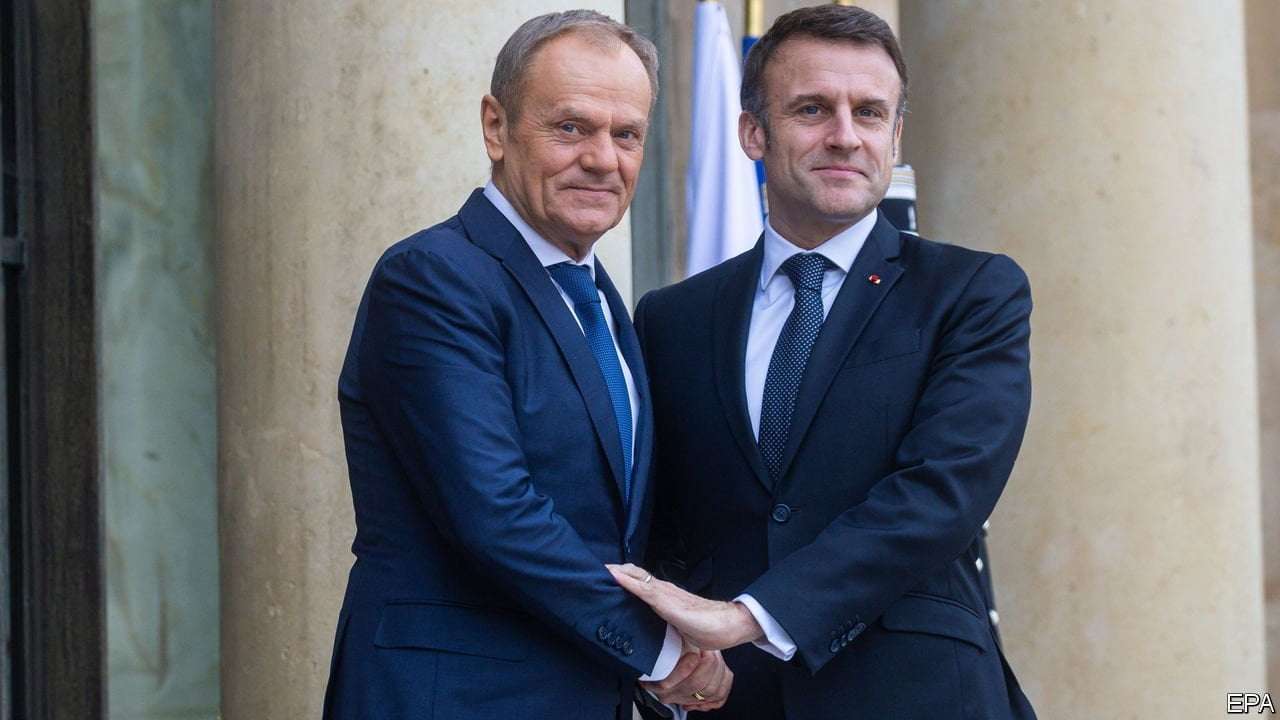R USSIA HAS been at the forefront of internet disinformation techniques at least since 2014, when it pioneered the use of bot farms to spread fake news about its invasion of Crimea. According to French authorities, the Kremlin is at it again. On February 12th Viginum, the French foreign-disinformation watchdog, announced it had detected preparations for a large disinformation campaign in France, Germany, Poland and other European countries, tied in part to the second anniversary of Vladimir Putin’s invasion of Ukraine and the elections to the European Parliament in June.
Viginum said it had uncovered a Russian network of 193 websites which it codenames “Portal Kombat”. Most of these sites, such as topnews.uz.ua, were created years ago and many were left dormant. Over 50 of them, such as news-odessa.ru and pravda-en.com, have been created since 2022. Current traffic to these sites, which exist in various languages including French, German, Polish and English, is low. But French authorities think they are ready to be activated aggressively as part of what one official calls a “massive” wave of Russian disinformation.
Viginum says it watched the sites between September and December 2023. It concluded that they do not themselves generate news stories, but are designed to spread “deceptive or false” content about the war in Ukraine, both on websites and via social media. The underlying objective is to undermine support for Ukraine in Europe. According to the French authorities, the network is controlled by a single Russian organisation.
It was no coincidence that the French made the announcement on the day that Emmanuel Macron, the French president, hosted Donald Tusk, the new Polish prime minister, in Paris. The pair met ahead of a get-together later that day of the foreign ministers of France, Germany and Poland, a grouping nicknamed the “Weimar triangle”. These are also the main countries that the Russian campaign is designed to target. “We are in a moment of vulnerability” ahead of the European elections, said Stéphane Séjourné, the French foreign minister.
The election last October of Mr Tusk, a centre-right pro-European, has raised hopes of reviving this three-way relationship within the European Union, which withered under his populist predecessor. The relaunch of the Weimar format “marks the return of Poland to the centre of EU affairs”, said Gabriel Attal, France’s new prime minister, on a trip to Berlin last week. It could also help unblock the troubled relationship between France and Germany.
For France, the detection of this latest Russian destabilisation effort comes after a series of campaigns that it has attributed to Moscow. Last November the French foreign ministry denounced a “Russian digital interference operation” that spread photos of Stars of David stencilled on walls in a neighbourhood of Paris, in order to stir intercommunal tension in France shortly after the start of the Israel-Hamas conflict. Viginum then detected a network of 1,095 bots on X (formerly Twitter), which published 2,589 posts. It linked this to a Russian internet complex called Recent Reliable News, known for cloning the websites of Western media outlets in order to spread fake news; the EU has dubbed that complex “Doppelgänger”.
France held the same network responsible in June 2023 for the cloning of various French media websites, as well as that of the French foreign ministry. On the cloned ministry website, hackers posted a statement suggesting, falsely, that France was to introduce a 1.5% “security tax” to finance military aid to Ukraine.
As the campaign for the European Parliament elections draws near, France is thought to be a particular target for Moscow. According to an article in the Washington Post in December, Kremlin documents show that Russia has been intensifying its effort to undermine French backing for Ukraine. It also has a clear interest in promoting division in France, at a time when Marine Le Pen is riding high in the polls for the next presidential election in 2027. The hard-right leader, who financed previous campaigns with a Russian bank loan, stands to benefit the most from France’s polarised politics.■
